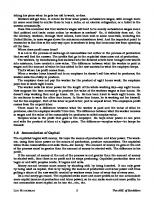The Two Souls of Socialism
391 43 2MB
English Pages [32] Year 1966
Recommend Papers

- Author / Uploaded
- Hal Draper
File loading please wait...
Citation preview
GEOFFREY W. WHITE
,
2434 Woolsey Street Berkeley, Calif. 94705
Pamph let No. 3 published by the
INDEPENDENT SOCIALIST COMMITTEE A Center for Socialist Education P.o. Box 910, Berkeley 1, Calif.
REVISED EDITION Copyright
®
1966
by Hal Draper
Bundle orders (5 & up, prepaid) at 20¢ each
Cover drawings by Lisa Lyons
P·3
is a crisis in the meaning of socialism. For the first time in the history of the world, very likely a majority of its people label themselves "socialist" in one sense or another; but there has never been a time when the label was less informative. The nearest thing to' a common content of the various "socialisms" is a negative: anti-capitalism. On the positive side, the range of conflicting and incompatible ideas that call themselves socialist is wider than the spread of ideas within the bourgeois world. Even anti-capitalism holds less and less as a common factor. In one part of the spectrum, a number of social-democratic parties have virtually eliminated any specifically socialist demands from their programs, promising to maintain private enterprise wherever possible. The most prominent example is the German social-democracy. ("As an idea, a philosophy, and a social movement, socialism in Germany is no longer represented by a political party," sums up D. A. Chalmers' recent book The Social Democratic Party of Germany.) These parties have defined socialism out of existence, but the tendency which they have formalized is that of the entire reformist social-democracy. In what sense are these parties still "socialist"? In another part of the world picture, there are the Communist states, whose claim to being "socialist" is based on a negative: the abolition of the capitalist private-profit system, and the fact that the class which rules does not consist of private owners of property. On the positive side, however, the socio-economic system which has replaced capitalism there would not be recognizable to Karl Marx. The state owns the means of production-but who "owns" the state? Certainly not the mass of workers, who are exploited, unfree, and alienated from all levers of social and political control. A new class rules, the bureaucratic bosses; it rules over a collectivist system-a bureaucratic collectivism. Unless statification is mechanically equated with "socialism," in what sense are these societies "socialist"? These two self-styled socialisms are very different, but they have more in common than they think. The social-democracy has typically dreamed of "socializing" capitalism from above. Its principle has always been that increased state intervention in society and economy is per se socialistic. It bears a fatal family resemblance to the Stalinist conception of imposing something called socialism from the top down, and of equating statification with socialism. Both have their roots in the ambiguous history of the socialist idea. Back to the roots: the following pages propose to investigate the meaning of socialism historically, in a new way. There have always been different "kinds SOCIALISM'S CRISIS TODAY
3
of socialism," and they have customarily been divided into reformist or revolutionary, peaceful or violent, democratic or authoritarian, etc. These divisions exist, but the underlying division is something else. Throughout the history of socialist movements and ideas, the fundamental divide is between SocialismFrom-Above and Socialism-From-Below. What unites the many different forms of Socialism-from-Above is the conception that socialism (or a reasonable facsimile thereof) must be handed down to the grateful masses in one form or another, by a ruling elite which is not subject to their control in fact. The heart of Socialism-from-Below is its view that socialism can be realized only through the self-emancipation of activized masses in motion, reaching out for freedom with their own hands, mobilized "from below" in a struggle to take charge of their own destiny, as actors (not merely subjects) on the stage of history. "The emancipation of the working classes must be conquered by the working classes themselves": this is the first sentence in the Rules written for the First International by Marx, and this is the First Principle of his life-work. It is the conception of Socialism-from-Above which accounts for the acceptance of Communist dictatorship as a form of "socialism." It is the conception of Socialism-from-Above which concentrates social-democratic attention on the parliamentary superstructure of society and on the manipulation of the "commanding heights" of the economy, and which makes them hostile to mass t
NOTE
,
This is a completely rewritten and expanded version of a study which originally









